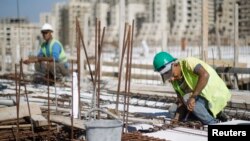The Palestinian economy would be twice as large as it is now if there were no Israeli occupation of Palestinian territories, according to a report released Tuesday by the U.N. Conference on Trade and Development.
The UNCTAD report argues the Palestinian territories have all the makings of a viable independent state but cannot reach their potential as long as they remain occupied territories.
Mahmoud Elkhafif, UNCTAD's coordinator for assistance to the Palestinian people, said the cost of occupation was substantial, but he acknowledged there was no systematic way of measuring it.
“All of these studies actually are on the conservative side, because everybody is scared to be realistic, to assess the impact of the Israeli occupation," Elkhafif said. "But if we add up all of these figures, it will not be less than the size of the Palestinian economy. In a sense, without occupation, the Palestinian economy would have been able to produce twice as much as it is producing today. We are talking about $13 billion in today’s money.”
The UNCTAD study noted that more than 66 percent of grazing land in the West Bank was not accessible to Palestinian producers; the cost of that fact to the Palestinian economy was $4.4 billion last year, it said.
On Gaza, the report said producers were being denied access to half of arable land and 85 percent of fishery resources. Elkhafif said this was taking a toll on the lives of the Palestinian people: Poverty has increased, and unemployment in all of the occupied territories stands at 25 percent.
“Unemployment in Gaza actually is about 38 percent," he said. "Food insecurity affects two-thirds of the Palestinian population. … The Palestinian economy continues to be a captive market for the Israeli economy. As a matter of fact, the trade deficit in 2015 represents around 41 percent of the Palestinian GDP.”
UNCTAD economists consider trade to be the cornerstone upon which economic development can be built. They argue for the establishment of a systematic, rigorous and comprehensive way of assessing the ongoing economic cost of occupation.
Last month, the United States rebuked Israel for the Jewish state's plans to accelerate the building of settlements in the West Bank in the face of mounting international concern. The U.S. has urged Israel and the Palestinians to "take meaningful steps" to build trust.




